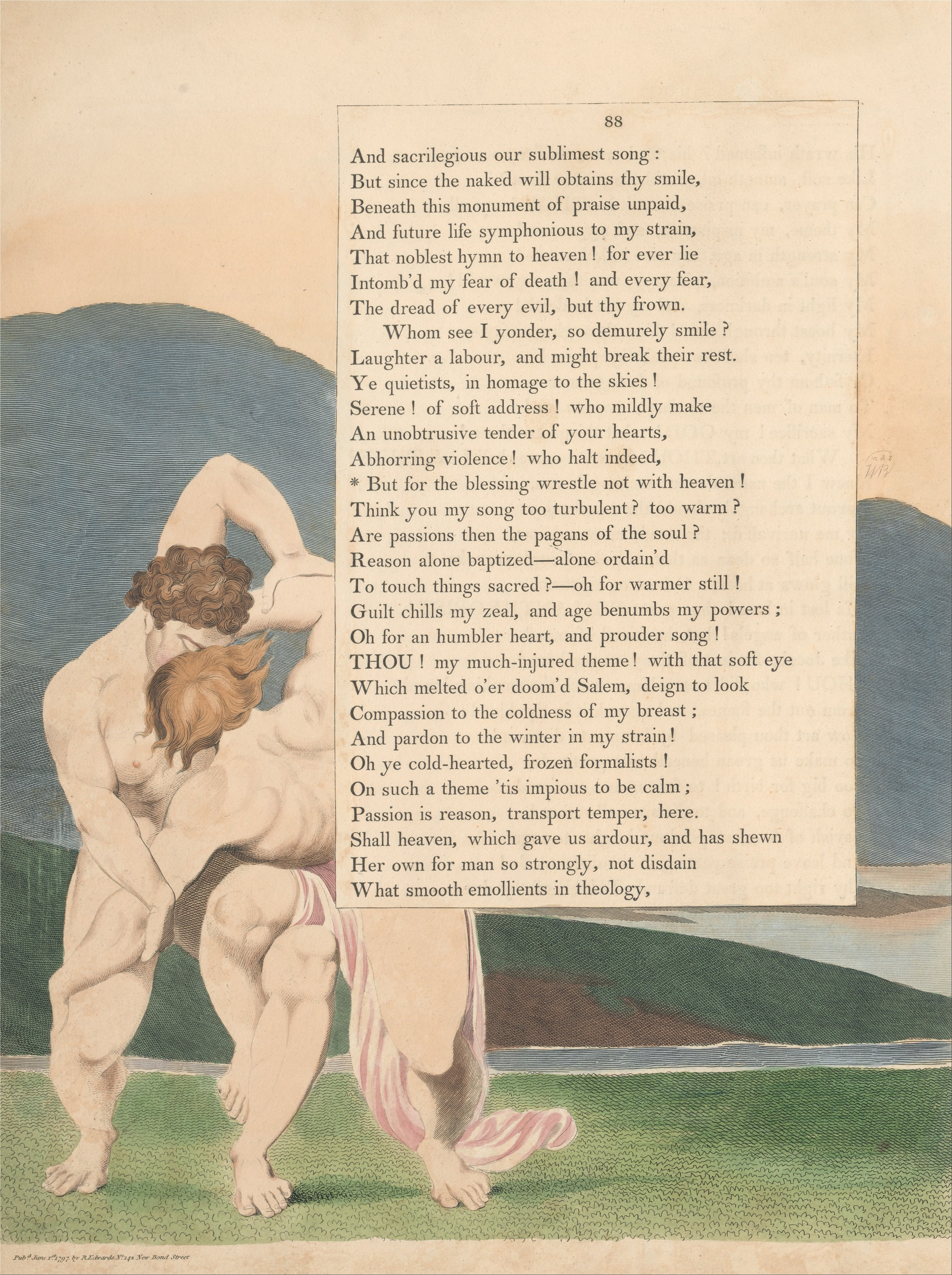 |
Wikipedia Commons A Large Book of Designs Albion Rose |
The final task is reassembling Albion in his pristine unity. All of the dividing, dissension and disintegration that went before is counter-balanced by synthesyzing the symbols which were so carefully developed in analyzing the process of dividing the Eternal Man.
Four Zoas , Night IX, (E 406)
"The Sun has left his blackness & has found a fresher morning
And the mild moon rejoices in the clear & cloudless night
And Man walks forth from midst of the fires the evil is all consumd
His eyes behold the Angelic spheres arising night & day
The stars consumd like a lamp blown out & in their stead behold
The Expanding Eyes of Man behold the depths of wondrous worlds
One Earth one sea beneath nor Erring Globes wander but Stars
Of fire rise up nightly from the Ocean & one Sun
Each morning like a New born Man issues with songs & Joy
Calling the Plowman to his Labour & the Shepherd to his rest
He walks upon the Eternal Mountains raising his heavenly voice
Conversing with the Animal forms of wisdom night & day
That risen from the Sea of fire renewd walk oer the Earth
For Tharmas brought his flocks upon the hills & in the Vales
Around the Eternal Mans bright tent the little Children play
Among the wooly flocks The hammer of Urthona sounds
In the deep caves beneath his limbs renewd his Lions roar
Around the Furnaces & in Evening sport upon the plains
They raise their faces from the Earth conversing with the Man
How is it we have walkd thro fires & yet are not consumd
How is it that all things are changd even as in ancient times
PAGE 139
The Sun arises from his dewy bed & the fresh airs
Play in his smiling beams giving the seeds of life to grow
And the fresh Earth beams forth ten thousand thousand springs of life
Urthona is arisen in his strength no longer now
Divided from Enitharmon no longer the Spectre Los
Where is the Spectre of Prophecy where the delusive Phantom
Departed & Urthona rises from the ruinous walls
In all his ancient strength to form the golden armour of science
For intellectual War The war of swords departed now
The dark Religions are departed & sweet Science reigns
End of The DreamFour Zoas, Night IX, Page 137, (E 405)
"Luvah & Vala woke & all the sons & daughters of Luvah
Awoke they wept to one another & they reascended
To the Eternal Man in woe he cast them wailing into
The world of shadows thro the air till winter is over & gone"Urthona too has a place in the unconscious where his work is continued. He feeds the conscious mind with the bread of sweet thought and the wine of delight.Four Zoas, Night IX, Page 137, (E 405)
"But the Human Wine stood wondering in all their delightful Expanses
The Elements subside the heavens rolld on with vocal harmony
Then Los who is Urthona rose in all his regenerate power
The Sea that rolld & foamd with darkness & the shadows of death
Vomited out & gave up all the floods lift up their hands
Singing & shouting to the Man they bow their hoary heads
And murmuring in their channels flow & circle round his feet
PAGE 138
Then Dark Urthona took the Corn out of the Stores of Urizen
He ground it in his rumbling Mills Terrible the distress
Of all the Nations of Earth ground in the Mills of Urthona
In his hand Tharmas takes the Storms. he turns the whirlwind Loose
Upon the wheels the stormy seas howl at his dread command
And Eddying fierce rejoice in the fierce agitation of the wheels
Of Dark Urthona Thunders Earthquakes Fires Water floods
Rejoice to one another loud their voices shake the Abyss
Their dread forms tending the dire mills The grey hoar frost was there
And his pale wife the aged Snow they watch over the fires
They build the Ovens of Urthona Nature in darkness groans
And Men are bound to sullen contemplations in the night
Restless they turn on beds of sorrow. in their inmost brain
Feeling the crushing Wheels they rise they write the bitter words
Of Stern Philosophy & knead the bread of knowledge with tears & groansFour Zoas , Night IX, Page 138, (E 406)"Such are the works of Dark Urthona Tharmas sifted the corn
Urthona made the Bread of Ages & he placed it
In golden & in silver baskets in heavens of precious stone
And then took his repose in Winter in the night of Time"Letters,To Flaxman, (E 709)
"My Friend & Thine Descend & Ascend with the Bread & the Wine The Bread of sweet Thought & the Wine of Delight Feeds the Village of Felpham by day & by night"
Songs and Ballads, (E 476)
"Then shall we return & see
The worlds of happy Eternity
& Throughout all Eternity
I forgive you you forgive me
As our dear Redeemer said
This the Wine & this the Bread"__________________________________________________











